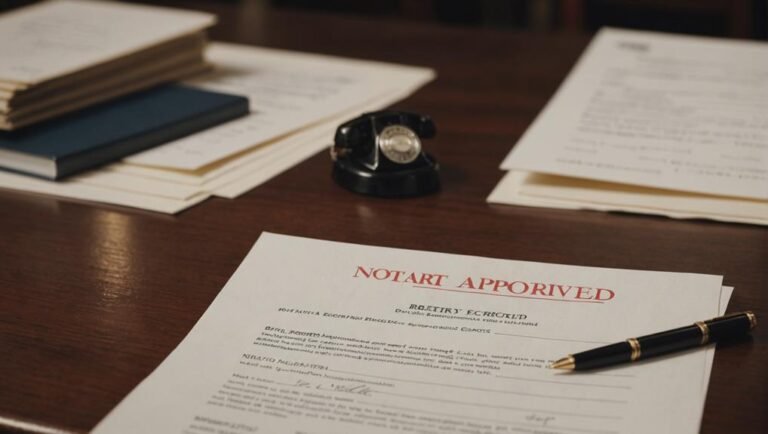In Florida, notaries are required to have a seal per Florida Statute 117.05. The seal is vital for validating notarized documents and must display specific details like your name and commission number. Make sure your seal includes necessary information and is applied using a rubber stamp with black ink. An embosser can enhance but not substitute the inked stamp. Using a clear, legible stamp in the correct format is crucial for validity. If you wish to guarantee your notarizations meet state guidelines, comprehending the requirements for your notary stamp is essential.
Key Takeaways
- Florida notaries are required to have a seal per Florida Statute 117.05.
- The seal is typically applied using a rubber stamp with specific information.
- Notary seals in Florida must display the notary's name, commission number, expiration date, and State of Florida.
- Embossers can be used to complement the inked stamp but not replace it.
- Notarized electronic documents in Florida require seal information but not necessarily a direct seal image.
Florida Notary Seal Requirements
When becoming a Florida notary, familiarize yourself with the state's strict requirements regarding the use of an official seal on notarized documents. The Florida notary seal plays a pivotal role in validating the authenticity of notarized documents. It must be applied using a rubber stamp with black ink, securing clear and reproducible impressions. The seal should display essential information such as the notary's name, commission number, expiration date, and the State of Florida. It's important to note that while embossers can be used as a supplementary tool, they can't replace the necessary inked stamp.
For electronic documents, the notary seal information is still mandatory, although a direct image of the seal isn't always necessary. Notaries should carefully design their seal to meet Florida's specifications, ensuring compliance with the law. If customization is desired, consulting with a reputable vendor is recommended to secure that the seal meets all necessary requirements for official notarization.
Notary Seal Vs. Notary Stamp
Differentiating between a notary seal and a notary stamp is essential for understanding their distinct roles in the notarization process. In Florida, a notary seal is a requirement outlined in Florida Statute 117.05 and is commonly applied using a rubber stamp with ink. While an embosser can be used in conjunction with the seal, it cannot substitute the inked stamp. The content of the notary seal must include specific details such as the notary's name, commission number, expiration date, and the State of Florida. Here is a comparison table to illustrate the differences between a notary seal and a notary stamp:
| Notary Seal | Notary Stamp |
|---|---|
| Required by Florida Statute | Also essential for notarization |
| Applied using a rubber stamp | Utilized for imprinting |
| Contains specific notary information | Contains notary's details |
| Must include state information | Typically includes commission number |
Ordering a Florida Notary Stamp
To guarantee compliance with Florida's notary regulations, the process of ordering a Florida notary stamp involves specific considerations and requirements. Florida notaries must make sure that the stamp they order is a rubber, inked stamp as per state guidelines.
When ordering a Florida stamp, make certain it includes essential information such as your name, commission number, expiration date, and the State of Florida. These details are vital for the validity of notarized documents in Florida.
While embossers can be used as a complement to the seal, they can't replace the inked stamp. It's important to adhere to the state's specific requirements for notarization to make sure that your notary stamp is in compliance with Florida law.
Proper Use of Notary Stamp
Proper utilization of the notary stamp is essential for guaranteeing the authenticity and legality of notarized documents in Florida. When using your stamp seal, it's important to employ a rubber, inked stamp in black ink to secure reproducibility.
Remember, while an embosser can complement the seal, it should never replace the inked stamp. Your seal must contain specific information such as your name, commission number, expiration date, and the State of Florida.
For electronic documents, the notary seal information is still required, but an actual image of the seal isn't mandatory. By adhering to these guidelines, you uphold the integrity of the notarization process and fulfill your duties as a Florida notary.
Always guarantee that your notary stamp is clear, legible, and properly aligned to avoid any discrepancies in the authentication of important documents.
Florida Notary Seal Embossers
Using a notary seal embosser in conjunction with an inked notary stamp is allowed for Florida notaries looking to enhance the authentication of their notarized documents. Notary seal embossers create a raised impression of the notary seal on documents, adding an additional level of security and professionalism. There are various kinds of Florida notary seal embossers available, such as desk embossers and handheld embossers, giving notaries the freedom to select based on their preferences and requirements. It is worth mentioning that the utilization of a notary seal embosser complements, rather than replaces, an inked notary stamp. Florida notary seal embossers must comply with state requirements for notarization and document authentication to guarantee the validity and legality of the notarized documents.
| Types of Florida Notary Seal Embossers | Description |
|---|---|
| Desk Embossers | Intended for stationary embossing needs |
| Handheld Embossers | Portable choice for on-the-go notarizing |
Legal Compliance With Notary Stamp
In maintaining legal compliance with notary stamp requirements in Florida, it's essential to make sure that the official seal used on notarized documents adheres to specific criteria set forth by state law. Florida notaries are mandated to utilize rubber, inked stamps when affixing their official seal, with embossers permitted as a supplementary tool but not a substitute.
The seal must be imprinted in black ink to secure reproducibility. While the exact shape and dimensions of the seal aren't strictly outlined by Florida law, it must include key details like the notary's name, commission number, expiration date, and the State of Florida.
Even for electronic documents, notarial certificates necessitate the inclusion of seal information, although a direct image of the stamped seal isn't mandatory for digital files. Securing these requirements are met secures the validity and legal compliance of notarized documents in the state of Florida.
Validity and Expiration of Notary Stamp
The validity of a Florida notary stamp is directly linked to the duration of the notary's commission term. It's essential for Florida notaries to be aware of the expiration date on their stamp and commission certificate.
Here are some important points to keep in mind regarding stamp validity and expiration:
- Check Expiration Date: Always make sure to check the expiration date on your notary stamp and commission certificate to avoid using them past the valid period.
- Prohibited Use: Using the stamp after the notary commission expires is strictly forbidden by Florida law.
- Proper Disposal: Dispose of the stamp correctly upon commission expiration to prevent any unauthorized use.
- Order Extra Stamps: Think about ordering extra stamps as a backup in case of damage or loss to guarantee continuity in your notarial duties.
Being mindful of these details will help you maintain compliance with Florida notary regulations and carry out your notarial duties effectively.
Frequently Asked Questions
Does Florida Notary Require a Seal?
Florida notaries are required to have an official seal on notarized documents. The seal, in black ink, must include the notary's name, commission number, expiration date, and the State of Florida, per notary regulations.
Where Does a Notary Place Their Seal?
To guarantee validity, place your notary seal in the bottom left corner of the document. Proper placement is essential for clear visibility and emphasizes the significance of positioning on the page. Make sure it's easily noticeable.
How Do I Make My Notary Seal Visible?
To make your notary seal visible, guarantee proper placement near your signature. Address visibility concerns by using a clear, legible notary stamp design in black ink. Include essential details like your name, commission number, expiration date, and Florida state.
Can a Florida Notary Notarize Their Own Signature?
You can't notarize your own signature as a Florida notary. Doing so violates notary ethics, has legal implications, and isn't considered best practice. Uphold the law by notarizing others' signatures, following state regulations.
Conclusion
So, do Florida notaries have a seal? Yes, they do.
The Florida Notary Seal is an essential tool in notarizing documents and ensuring legal compliance. By properly using a notary stamp and seal, notaries can certify the authenticity of signatures and protect against fraud.
Remember, the validity and expiration of the notary stamp are significant considerations in maintaining legal compliance.
Are you ready to make your mark as a Florida notary?






